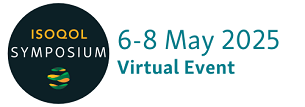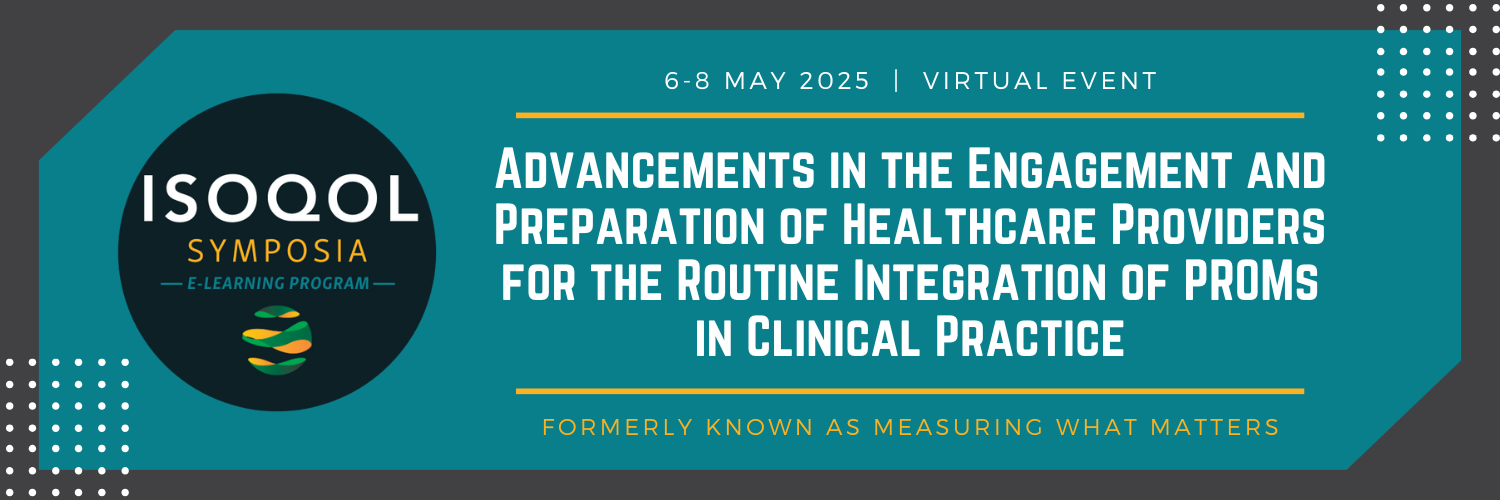Register today to attend the ISOQOL 1st Virtual Symposium, an event focused on challenges that healthcare providers (HCPs) encounter in the integration of patient-reported outcome measures (PROMs) into routine practice.
Scheduled for three half-days from 6-8 May 2025, this virtual event will consist of panel discussions, presentations, an interactive online activity, real world case studies, and live attendee engagement and interaction with the speakers.
Session Highlight
Session 1: What Does it Mean to Implement PROMs in Clinical Practice?
Although the use of PROMs in practice is increasing, sometimes HCPs face barriers when trying to use PROMs across various clinical settings and inter-professional teams. Implementing PROMs on a wide scale poses significant challenges, as it requires engaging providers and changing their clinical practice (e.g., workflow and roles). This first session provides an overview of Implementation Science (IS) frameworks to guide the workshop and illustrate the intersection between the “user” and “implementation process” domains. Also, we will review key terms/nomenclature and discuss the underlying assumptions that frame this symposium. Finally, examples of the various ways in which PROMs can be adopted in clinical practice (e.g., screening, assessment, monitoring, planning, and evaluating care/treatment) will be discussed.
Session Speakers:

Angela C. Wolff, PhD RN
School of Nursing, Trinity Western University
Angela C. Wolff, PhD, RN is an Associate Professor at the Trinity Western University School of Nursing (British Columbia, Canada) where she teaches leadership and research-based courses and conducts research about how healthcare providers successfully integrate people-centered assessment tools into practice. Angela has received numerous grants to support this work including a systematic review about barriers and facilitators for patient-reported outcome measure adoption and knowledge translation for the routine use of quality-of-life assessments in community mental health. Her most recent innovation grant is about incorporating equitable people-centered assessments (in the form of PROMs) into undergraduate nursing education. Her involvement in ISOQOL includes Co-Chair of the Clinical Practice Special Interest Group and leading workshops on preparing clinicians to adopt PROMs. Angela is passionate advancing the professional practice of nurses to provide people-centered equitable healthcare to patients, families, and communities.

Elizabeth J. Austin, PhD MPH
Department of Health Systems and Population Health, University of Washington
Elizabeth J. Austin, PhD MPH, is a Senior Research Scientist in the Department of Health Systems and Population Health at the University of Washington. She conducts a variety of evaluative and implementation-focused research that targets patient-provider interactions, addressing the informatics, workflow, organizational elements that can lead to more patient-centered clinical decision-making. She previously served as Co-Chair of the ISOQOL Clinical Practice Special Interest Group and has co-led four national/international workshops on PRO implementation in clinical practice. She has implemented patient-reported outcome measures in surgical, primary care, pediatric, and behavioral health care settings across the U.S and led the development of a toolkit to guide health systems in electronic PRO implementation (epros.becertain.org).

The International Society for Quality of Life Research (ISOQOL) is a global community of researchers, clinicians, health care professionals, industry professionals, consultants, and patient research partners advancing health related quality of life research (HRQL).
Together, we are creating a future in which patient perspective is integral to health research, care and policy.


